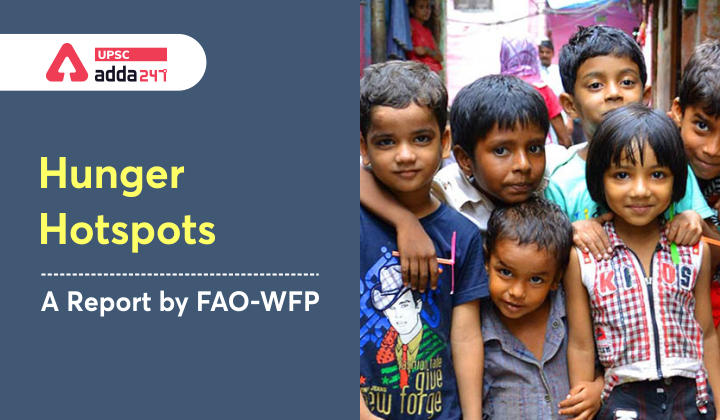Table of Contents
Relevance
- GS 2: Issues related to poverty and hunger
Context
- In a new report, FAO-WFP (World Food Program) warned that hunger is expected to rise in 23 global hotspots across the world.
What are hunger hotspots?
- These are areas where acute food insecurity is likely to deteriorate over the coming months.
Key points
- The report said that acute food insecurity is likely to further deteriorate in the near future.
- Ethiopia was put at the top of the list as the number of people facing starvation and death is more than even those died in famine in Somalia in 2011.
- Similarly, in southern Madagascar, people are pushed into “catastrophic” acute food insecurity marked by starvation and death due to drought, pests affecting staple crops, and rising food prices.
- Acute hunger is increasing not only in scale but also severity. Moreover, over 41 million people worldwide are now at risk of falling into famine or famine-like conditions.
- South Sudan, Yemen and Nigeria remain at the highest alert level due to famine like situation.
- In Afghanistan, people are expected to face the second-highest level of food insecurity.
- India is not among the hunger hotspots of the word. In fact, Afghanistan is the only Asian country in the list.
 Get free video for UPSC CSE preparation and make your dream of becoming an IAS/IPS/IRS a reality
Get free video for UPSC CSE preparation and make your dream of becoming an IAS/IPS/IRS a reality
Reasons
- Conflict dynamics: Violence in these regions is going to increase. It will aggravate food insecurity because of new displacements, disruption of trade and cropping, restriction of population movements, confinement of communities, abandonment of agricultural land, and loss of life and assets.
- Economic shocks: COVID-19 has led to the following events: Decreased revenues from remittances; Reduced commodity exports; Limited tourism and industrial production; Government expenditures in a near-shut down like situation has led to debt trap for the government.
- Weather extremes: Weather and climate extremes driven by the ongoing La Niña event, are likely to affect several parts of the world. Poor rainfall in Afghanistan, above-average rainfall in South Sudan, locust attacks in Ethiopia, drought in Madagascar.
- Diffusion of plant pests and animal diseases: Transboundary threats like e desert locust situation in East Africa and on the Red Sea Coast poses a serious threat to summer cropping.
- Humanitarian access constraints: It continue to be a prominent aggravating factor for acute food insecurity, hampering crisis-affected populations’ access to much-needed humanitarian assistance.
The Editorial Analysis: An emigration Bill that does not go far enough
Recommendations
- For agriculture
- Distribute drought-tolerant crop seeds to the farmers.
- Adopt plant protection measures.
- Distribute livestock protection kits with veterinary support.
- For masses
- Increase unconditional cash transfers as a short-term income boost for meeting emergency food, nutrition and other basic needs.
- For infrastructure
- Ramp up food assistance for asset creation and resilience-oriented activities, including watershed management and rehabilitation of small-scale water harvesting and irrigation infrastructure.
- For humanitarian aid
- Diversify supply corridors in regions marred with frequent conflicts.
- For rural areas
- Ensure school-age child feeding in the poorest communities nationwide, connecting with local food production in order to improve rural economies.
- For malnourished population
- Reinforce supplementary nutrition assistance to women and children in areas with high malnutrition rates, in coordination with government.
Way forward
- Gandhiji said that there are people in the world so hungry, that God cannot appear to them except in the form of bread.
- Developed countries and the multilateral institutions like the World Bank have the prerogative to take humanitarian action in these regions and save thousands of lives.



 TSPSC Group 1 Question Paper 2024, Downl...
TSPSC Group 1 Question Paper 2024, Downl...
 TSPSC Group 1 Answer key 2024 Out, Downl...
TSPSC Group 1 Answer key 2024 Out, Downl...
 UPSC Prelims 2024 Question Paper, Downlo...
UPSC Prelims 2024 Question Paper, Downlo...
